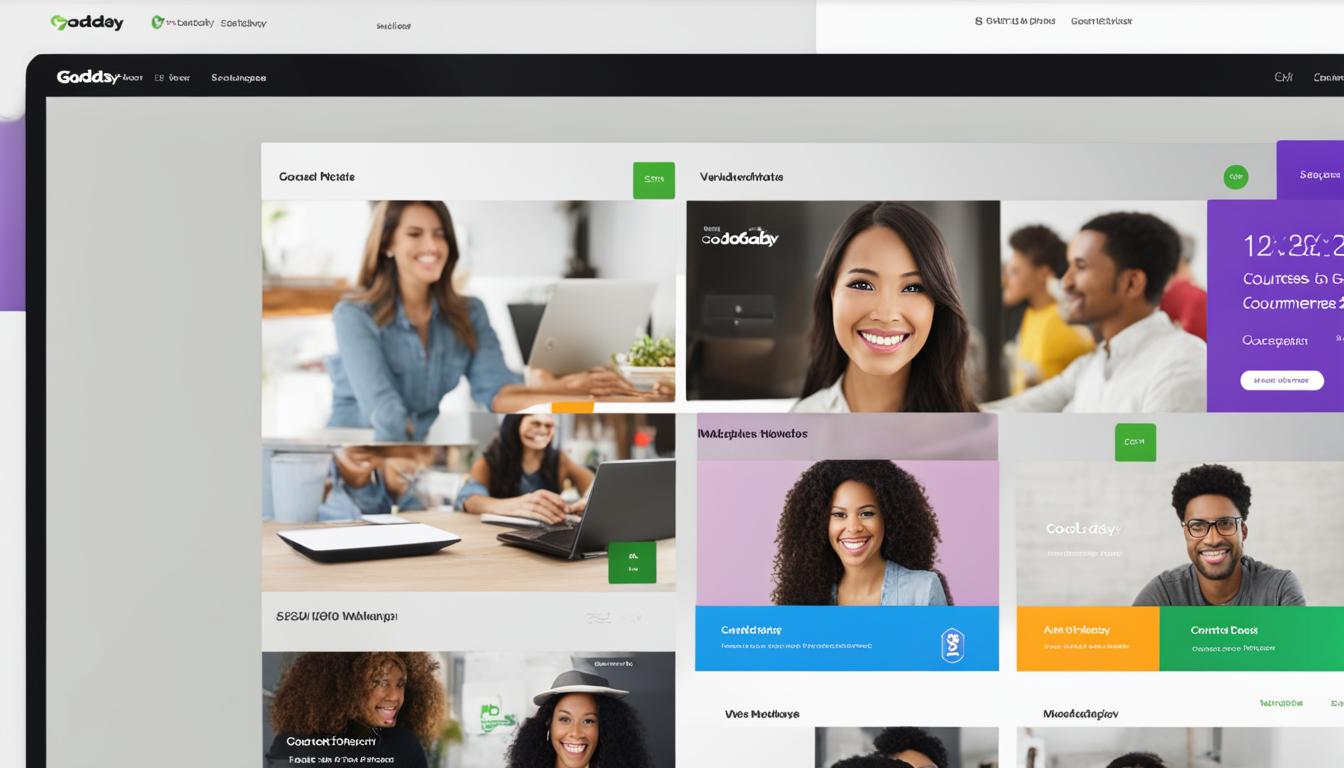Hosting your website on a server
Did you know that there are currently over 1.8 billion websites on the internet? That’s right, billions of websites vying for attention and online success. So, how can you ensure that your website stands out from the crowd? One crucial step is hosting your website on a server. In this article, I will guide you through the process of hosting your own website, exploring the best web hosting options and uncovering the secrets to secure server hosting. Get ready to take your online presence to new heights!
Key Takeaways:
- Choosing the right web hosting service is crucial for establishing a strong online presence.
- The first step is to select a content management system (CMS) that suits your needs, such as WordPress or a website builder.
- Consider factors such as storage, bandwidth, uptime guarantees, and price when choosing a web hosting provider.
- Registering a domain name and connecting it to your web host are essential steps in the hosting process.
- Installing WordPress is made easy with one-click installation options offered by most web hosting providers.
Choosing a Content Management System (CMS)
When it comes to hosting your own website, one of the first decisions you’ll need to make is choosing a content management system (CMS). A CMS is a software platform that allows you to create, manage, and publish content on your website without the need for extensive coding or technical skills.
There are two main types of CMS platforms: WordPress and website builders like Wix, Squarespace, or Shopify. Let’s take a closer look at each option:
WordPress
WordPress is a popular CMS that offers a wide range of customization options and flexibility. It is free and open-source, meaning that you have access to the underlying code and can modify it to suit your needs. However, using WordPress requires third-party web hosting, which means you’ll need to find a hosting provider that supports WordPress.
With WordPress, you can create and customize your website using themes and plugins. There are thousands of free and premium themes available, allowing you to design a unique and professional-looking site. Additionally, plugins extend the functionality of your website, allowing you to add features such as contact forms, e-commerce capabilities, and SEO optimization.
Website Builders
If you’re looking for a more intuitive and all-in-one solution, website builders like Wix, Squarespace, or Shopify might be the right choice for you. These platforms provide a user-friendly interface and handle both the CMS and web hosting aspects of your website.
Website builders typically offer a range of templates and customization options to help you create your website without the need for coding knowledge. They often have drag-and-drop editors, making it easy to arrange and style your content. Additionally, they may offer built-in features such as e-commerce functionality, blog support, and SEO tools.
When choosing a CMS, it’s important to consider factors such as ease of use, customization capabilities, and cost. WordPress provides more control and flexibility, but it requires additional steps for web hosting. Website builders offer a simpler all-in-one solution, but they may have more limited customization options. Evaluate your needs and preferences to determine which CMS option is best suited for your website.
Choosing a Web Hosting Service
Once you’ve settled on using WordPress as your content management system (CMS), the next crucial step is selecting a reliable web hosting service. With numerous options available, it’s important to consider various factors before making a decision. Here are some popular web hosting providers:
- Bluehost
- DreamHost
- Hostinger
- IONOS
When comparing web hosting services, it’s essential to evaluate key features:
- Storage and Bandwidth: Make sure the hosting plans provide sufficient storage space and bandwidth for your website’s needs.
- Uptime Guarantees: Look for providers that offer high uptime guarantees to ensure your website remains accessible to visitors.
- Speed: Consider the hosting service’s server speed, as faster loading times contribute to a positive user experience.
- Contract Length: Check whether the hosting service requires long-term contracts and consider your flexibility requirements.
- Price: Compare the costs of different hosting plans and choose one that fits your budget.
For new websites, it’s advantageous to select a hosting plan that includes additional benefits such as:
- Free Domain Name
- Free SSL Certificate
- One-Click WordPress Installation
If you already have an existing site and wish to switch hosting providers, consider a web host that offers a free WordPress site migration service.

Choosing the right web hosting service is crucial for the success of your website. Take the time to assess your requirements and compare different providers to find the perfect fit for your needs.
Domain Registration and Connection
Registering a domain name is an important step in the hosting process. It not only gives your website a unique online identity but also makes it easier for visitors to find you. When it comes to domain registration, you have several options to choose from.
One popular choice is Namecheap, a trusted domain registrar known for its competitive prices and user-friendly interface. Another reputable option is Domain.com, which offers a wide range of domain extensions to suit different business needs. If you prefer a well-known brand, Google Domains is a reliable choice that also provides seamless integration with other Google services.

Some web hosting providers may offer a free domain name when you sign up for their hosting services. This can be a convenient option, as it allows you to manage both your domain and hosting in one place. However, if you decide to purchase your domain separately, make sure to choose a registrar that offers easy domain management tools.
Once you have registered your domain, you need to connect it to your web host. The connection is made through the Domain Name Servers (DNS) which are responsible for directing visitors to the correct server where your website is hosted. The specific steps to connect your domain to your web host may vary depending on where you purchased your domain name.
Most web hosting providers will provide you with the necessary DNS addresses that you need to update in your domain registrar account. This process typically involves logging in to your domain registrar’s website, navigating to the DNS settings, and replacing the existing DNS addresses with the ones provided by your web host. The changes may take some time to propagate, but once completed, your domain will be connected to your web host.
It is important to note that if you are using a web hosting service that includes a free domain name, the connection process may be simplified as the hosting provider will handle the DNS configuration for you.
Installing WordPress
Once you have registered your domain and connected it to your web host, the next step is to install WordPress. Most web hosting providers offer a convenient one-click installation feature, making the process quick and hassle-free.
You can access the one-click installation feature through your web hosting account or cPanel. Simply log in to your account and look for the WordPress installation option. With just a few clicks, you’ll have WordPress up and running on your website.
If you already have an existing WordPress website and are switching hosting providers, you may need to perform a WordPress migration. Some hosting providers offer WordPress migration services to help you seamlessly transfer your website from one host to another. Keep in mind that there may be an additional fee involved for this service, depending on the hosting provider.
With WordPress installed, you’re ready to start creating and customizing your website. WordPress offers a user-friendly interface and a wide range of themes and plugins to help you design a professional-looking site. Take advantage of the flexibility and powerful features WordPress has to offer to make your website stand out.
| Pros | Cons |
|---|---|
| Easy one-click installation | Additional fee for WordPress migration service |
| User-friendly interface | |
| Wide range of themes and plugins |
Web Hosting Services for Small Businesses
As a small business, finding the right web hosting service is crucial to ensure your online presence is strong and reliable. Fortunately, there are several web hosting providers that cater specifically to the needs of small businesses. Here are some recommended options:
- MochaHost: If you’re looking for a low-cost hosting solution with unlimited storage and bandwidth, MochaHost is a great choice. They offer affordable plans that are perfect for small businesses looking to establish an online presence without breaking the bank.
- Interserver: For enhanced website security, Interserver is a top contender. They provide robust security features and protection against cyber threats, ensuring your business website remains safe and secure.
- A2 Hosting: When it comes to fast page loading speed, A2 Hosting excels. With their optimized servers and advanced caching technologies, your website will load quickly, providing your visitors with a seamless browsing experience.
- DreamHost: If you’re a beginner using WordPress, DreamHost is an excellent option. Their WordPress hosting plans are beginner-friendly and designed to simplify the website setup process, making it easy for small businesses to get started.
When selecting a web hosting service for your small business, it’s essential to consider your specific requirements. Evaluate factors such as cost, storage and bandwidth limits, security features, and ease of use. By choosing a hosting provider that offers the necessary features and support, you can ensure your small business website thrives online.
Having a reliable web hosting service is vital for the success of your small business. With the right hosting provider, you can build a secure and performant website that will attract customers and help your business grow.
Hosting Yourself vs. Using a Hosting Platform
When it comes to hosting your website, you have two options: hosting it yourself or using a hosting platform. Let’s take a closer look at each option and consider the factors you need to take into account.
Hosting Yourself
If you choose to host your website yourself, it’s important to note that it requires technical expertise and comes with the responsibility of server maintenance. You will need to have the necessary technical skills to set up and manage your server, ensuring it is secure and running smoothly. This option gives you full control over your hosting environment and allows for customization according to your specific needs. However, it requires a significant investment in time and effort to handle technical tasks and resolve any issues that may arise.
Using a Hosting Platform
On the other hand, using a hosting platform offers a more user-friendly and cost-effective solution. Hosting platforms provide a range of hosting options and take care of the technical maintenance and support, allowing you to focus on building and managing your website. These platforms often offer intuitive website builders that require little to no technical expertise, enabling you to create a professional-looking site without any coding knowledge. They also handle server maintenance, ensuring optimal performance and security for your website. This option is especially suitable for those who prefer a hassle-free experience and want to get their website up and running quickly.
When deciding between hosting yourself and using a hosting platform, consider your technical skills, budget, and the level of control you require. If you have the technical expertise and want complete control over your hosting environment, hosting yourself may be the right choice for you. However, if you prefer a cost-effective and user-friendly solution that saves you time and effort, using a hosting platform is the way to go.
Now that we have discussed hosting options, let’s take a closer look at the process of domain registration and connection in the next section.
Conclusion and Final Thoughts
Hosting your website on a server is an essential step in establishing an online presence. By following the steps outlined in this article, you can easily host your own website and choose the right web hosting service for your needs.
Consider factors such as CMS, web hosting provider, domain registration, and the specific requirements of your business. Whether you decide to host your website yourself or use a hosting platform, make sure to choose a reliable and secure server hosting solution.
Remember that hosting providers have come a long way in providing comprehensive support and resources for users, so don’t hesitate to reach out for assistance when needed.
In conclusion, web hosting is a crucial aspect of building and maintaining a successful website. By taking the time to research and select the best web hosting service for your needs, you can ensure that your website remains accessible, secure, and optimized for performance. Whether you are a small business owner or an individual starting your own blog, investing in a reputable web host is a wise decision. So, take the necessary steps to host your website properly and watch your online presence thrive.
FAQ
Why is hosting your website on a server important?
What is a content management system (CMS) and which one should I choose?
How do I choose a web hosting service?
Do I need to register a domain name separately?
How do I connect my domain to my web host?
How do I install WordPress?
What are some recommended web hosting services for small businesses?
Should I host my website myself or use a hosting platform?
What is the importance of secure server hosting?
- SEO for Entry Door Services - April 24, 2025
- Boosting Property Value: Why Halifax Windows and Doors Are a Smart Investment - April 24, 2025
- The Business Cost of Injury: Why Personal Injury Law Matters in a Financial World - April 16, 2025





















Post Comment
You must be logged in to post a comment.